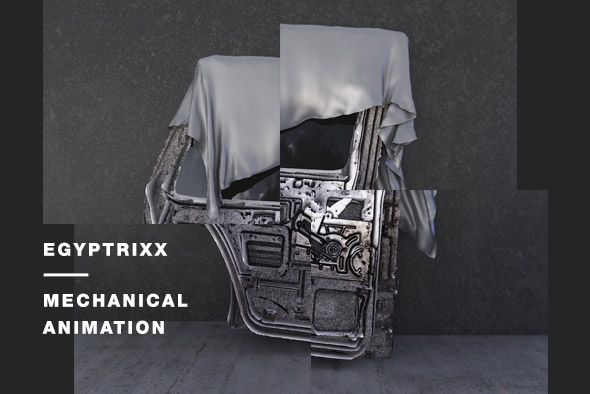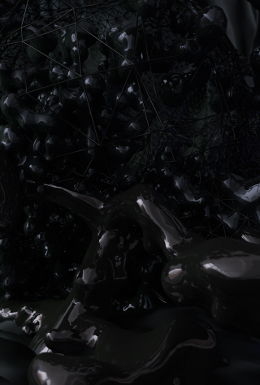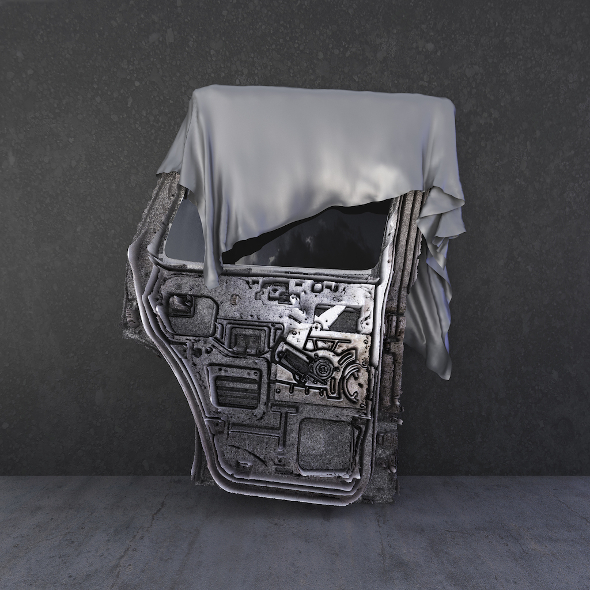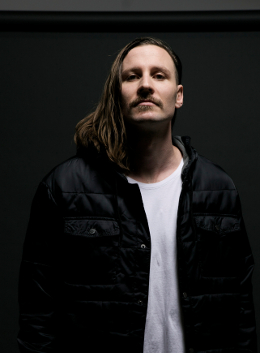Egyptrixx – Mechanical Animation

David Psutka speaks with Brendan Arnott about his new Egyptrixx album, its link with other forms of creativity and what the future holds for the Halocline Trance label.
It’s night time in Toronto, and I’m sitting on a bench in Parkdale watching my breath materialize in tiny little frozen clouds when Egyptrixx walks up to me. We make introductions and start to walk together in the brown-tinged early winter slush that’s taken over the sidewalks, and as I fall into step alongside David Psutka, we discuss what the last year has held for the Toronto-based producer. Perhaps, unsurprisingly, it’s been a blur of perpetual motion. In addition to 2013’s dense and largely beatless A/B til Infinity, touring stints in Europe and Canada, as well as producing and playing in a number of other projects that stray into realms like “ambient folk drone”, Psutka has been bouncing between Berlin, Mexico and Toronto for his work. He admits this schedule has taken on a semblance of sanity. “I don’t need to be travelling ten months of the year anymore” he says, laughing.
To adapt to the multiple different projects he’s balancing, Psutka’s developed an informal system. “I like to make a big pile of songs, and work on them simultaneously, but they’re kinda like sandcastles,” he tells me, “I come up with the initial idea really quickly, and it’s usually non-musical. I’ll write it out on paper, and don’t do anything with sound until I really have an idea of what the song is going to be.”
I ask what one of those ideas would look like on paper? “It’s mostly like structural idea,” he replies, “a lattice or beams or pulses, punctuated empty space. Shit like that.”
 This isn’t the last time Psutka will reference architecture in our time together. His latest album, released on his own Halocline Trance label, continues exploring the themes touched on in 2013’s A/B til Infinity, a collaborative project with Andreas Fischer whose conceptual art leanings made it feel like a studious dissection of the chaos and noise of a club space. “Normally there’s a mound of ideas, and when I write an album I select six or seven ideas from the pile, and then I’ll whittle away” he tells me. After finishing A/B til Infinity, Psutka felt as if there was more to probe. “In a way it’s like a sequel to the last record or a continuation anyway. There are a lot of the same sonic ideas and arrangement ideas as before.”
This isn’t the last time Psutka will reference architecture in our time together. His latest album, released on his own Halocline Trance label, continues exploring the themes touched on in 2013’s A/B til Infinity, a collaborative project with Andreas Fischer whose conceptual art leanings made it feel like a studious dissection of the chaos and noise of a club space. “Normally there’s a mound of ideas, and when I write an album I select six or seven ideas from the pile, and then I’ll whittle away” he tells me. After finishing A/B til Infinity, Psutka felt as if there was more to probe. “In a way it’s like a sequel to the last record or a continuation anyway. There are a lot of the same sonic ideas and arrangement ideas as before.”
One difference is in effect; last winter, I was lucky enough to watch the debut of Psutka music. Fischer’s visual projections were plastered all over a concrete loft space at a Toronto Boiler Room show, with alien geometries, and blood-tinged pulsating orbs bouncing off the walls in a hypnotic, absorbing manner. This time, video will take a backseat. “It’s a difficult thing to do flawlessly, there are too many variables that are impossible to control” Psutka tells me. “If you’re getting paid triple what I get paid to do a show, then I suppose you can fly out a crew of people, build your own stage and all this kinda stuff…” he says, trailing off. “We had somewhat idyllic aspirations for that Boiler Room performance,” he continues. “We didn’t want it to become some kind of spectacle-based festival thing with like ‘cool visuals’ up on stage and people standing in front of them… we wanted it to be more like an immersive thing, where the image is kind of all over the room and I was just off to the side.”
Touring internationally means the rigours of trying to keep video installations perfectly synced to Psutka’s music becomes a challenge. “So much of it is contingent on the venues you’re playing in, the promoters, their technical capabilities,” he says with a sigh. “And honestly, visual performances now are a bit of a gamble even at the best of times,” he says. “I’ve done about 30 of these visual shows now, and about 60 per cent of the time something goes wrong… and I don’t tour that much, so if I’m going to fly halfway across the fucking world to play a show some place, I don’t want it to be a major disappointment because of a video mixer or an input box or something stupid like that.” Psutka says laughing again, releasing some tension of a year spent stressing about projections. “So I’ll probably minimize that going forward,” he says, “but Andreas and I are still working together, and he’s definitely part of the label and its visual aesthetic.”
The cover of Transfer of Energy (Feelings of Power) is one such example of the continuing collaboration, featuring a stripped down metallic car door with a sheet draped over it, somehow tapping into the eerie iconology of an empire in decline; like something from a dystopic art exhibition honouring Detroit’s gritty,industrial past. Whatever the message behind the image, things seem to be teetering on the edge of collapse.

“I sort of came up with the idea and we worked together fashioning it,” Psutka states as snow begins to fall. “I think it’s a continuation of most of the stuff we’ve done, which is usually like, odd and iconic at the same time, weird but grandiose,” he says. “There’s a lot of symbolic content in that image,” he adss. “I think Andreas and I are both really interested in the sort of materiality of aluminium, concrete, steel, and the application of it like, bridges and architecture.” Though Psutka insists that his music’s “usually pretty loose from any kind of meaning”, he admits those ideas about texture and shape made their way into the record.
“Maybe one of the ideas in this record was the idea of mechanical animation,” Psutka furthers; “the act of providing power or electricity to something, and what a kind of strange, alien thing that is.” He uses power plants as an examples, describing them as a “mountain of steel which somehow becomes alive through this invisible current.” Psutka’s imagery and ideas of electrical current and alien machines feel slightly reminiscent of David Lynch’s body of work, and I ask if the director served as any kind of an inspiration. While he doesn’t see a direct connection, Psutka extrapolates, “he’s great at creating this diaphanous sense of anxiety and dread that often is suggested instead of revealed. Maybe that’s suggested in my music too,” he says. “Maybe there’s some atmospheric overlap.”
One of the most gripping things about Psutka’s new album is its ability to manifest spaces and environments. A barrelling torrent of percussion will announce itself front-and-centre of the track, while elsewhere, clanks and groans and creaking animations lurk half-muffled out back; the idea of distance constructed sonically. The result feels like a physical environment is being engineered, as if you’re gaining a sense of place through reflective echolocation.
“Technically speaking, I’m usually kind of obsessed with stereo fields” Psutka says to the sound of snow crunching under his boots. “Moving things around, making them seem further away or in your face, left and right, but I think with respect to articulating a 3D place, which is a way that I work in this project for sure, it’s more about the application of non-musical ideas, musically.” Glancing over to see if I’m comprehending, he continues. “It’s a tough thing to describe. Maybe it’s like… applying the idea of steel girders, but trying to express it musically… as opposed to articulating a real 3D place. A lot of the ideas for the songs are structural, architectural, non-musical ideas, so in a way it’s kind of like describing something that exists tangibly.”
For Psutka, there seems to be some ideological balancing at play. “I think to straddle this middle ground between real, tangible, articulated things, and then really coarse, material, structural ideas – like the idea of concrete… or solid steel… or, like, aluminium waste,” he says. “I think that’s an idea that I tried to bring into this record, but to imply those things with the arrangements of the songs and sounds.” He pauses, and chuckles. “I dunno, I mean, it’s pretty lofty, grandiose shit, I feel like I still haven’t mastered the idea behind the project.”
“You don’t need a definitive artist statement to accompany everything,” I add in response.
“Well, I think that is the definitive artist statement of this project,” he continues. “I think it always has been. Taking the ingredients of club music and giving them experimental, non-musical application. I just don’t think I’m very good at it yet. The project is still quite inchoate and raw, and I’m making a lot of mistakes, but I’m at ease with it. I have specific goals for this project and feel I’m just starting to approach them – for now, I embrace the flaws, I’m cool with it.”

We pass a parked police cruiser, and I think about the second half of the album’s title, “feelings of power”. While the first half of the title, “transfer of energy” is something that seems benign and scientific, explainable by a diagram in a chemistry textbook, “feelings of power” hold a raw and personal meaning, with the potential to be messy, violent and egomaniacal. In North America this winter, it’s been hard to escape the looming spectre of state violence cast by the police killings of Mike Brown, Tanesha Anderson, Eric Garner, and the subsequent Black Lives Matter and Die-ins protests. At times, Psutka’s album feels quite violent, with its lashing percussive measures puncturing and pummelling the empty space and I’m curious if his latest work relates to power in social relationships as well.
“I think the ambiguity in the title is intentional and that it can mean anything really” he responds. “As close as I can come to applying meaning to that statement is by talking about the provision of power, or the provision of electricity, and how things kind of go from being inert to active, and like, just that little evolution from dead to alive,” he says. “That’s a really vague, non-specific, interpretive thing – I think it really works well as a personal thing.”
He looks up at the frame of a tunnel we start to pass through, and continues. “The kind of art, architecture and music that I think about when I make Egyptrixx music is usually kind of grandiose and powerful, but also kind of abstract, and that, to me, is a really empowering thing,” Psutka says. “When I look at artists like Donald Judd, or Richard Cera – his work is so big and important feeling – but really, if you scale it down a little it’s like a shaving of steel or a wall,” he feels. “But the scale of it, the texture of it, the placing of it… y’know, it’s usually in some weird location… it makes it feel like the most important fucking thing ever, and you can’t even blink when you’re looking at it.”
It’s clear when speaking to Psutka music is closely tied to a number of other forms of creation. “I really like this Swiss artist, Not Vital,” he continues. “He’s a sculptor, and I named a song on the record after him. His stuff as well, it’s kind of a lot more molten and liquid, and it’s completely gibberish essentially, but the scale and location of it make it feel like the most important, awe-inspiring thing ever. And to me, that’s really empowering, and I try to do similar stuff with sound.”
 “Body II Body” is the single vocal collaboration on Transfer of Energy [Feelings of Power], featuring Toronto’s Nyssa, one of the many local artist Psutka has worked with in some capacity. He openly praises her singing ability, maintaining however the creative reins are tightly under his own control, writing the lyrics and melodies before passing them on. “I kind of just wanted to do one vocal track on this record” he says. “And I haven’t really listened to it yet with clear ears – I think you need a year of not hearing a record to go back to it and listen to it fresh, so I don’t even know if that song works to be honest. I wanted to leave it in,” he says.”Vocals are kind of funny in these songs, sometimes they don’t really make sense.”
“Body II Body” is the single vocal collaboration on Transfer of Energy [Feelings of Power], featuring Toronto’s Nyssa, one of the many local artist Psutka has worked with in some capacity. He openly praises her singing ability, maintaining however the creative reins are tightly under his own control, writing the lyrics and melodies before passing them on. “I kind of just wanted to do one vocal track on this record” he says. “And I haven’t really listened to it yet with clear ears – I think you need a year of not hearing a record to go back to it and listen to it fresh, so I don’t even know if that song works to be honest. I wanted to leave it in,” he says.”Vocals are kind of funny in these songs, sometimes they don’t really make sense.”
Offering encouragement, I mention that “Body II Body” is one of the most intersectional points on the record – the first and only time Psutka’s cold textures brush up against a beating heart. “I’d like to work with more vocalists on Egyptrixx records, but it’s… I dunno I’m really cautious,” he explains. “It’s such a weird and specific thing. I still don’t think I’ve fully… explained it to people, so when requests to collaborate come, they’re usually coming from a different angle. Ninety per cent of the time they want to make a pop song.”
In a similar vein, Psutka’s interactions with larger music imprints have also contained pressure to push things in a more commercial direction, one of the main reasons that Transfer of Energy (Feelings of Power) is the first release on Psutka’s own Halocline Trance label. “I think it gives me a bit more freedom to do what I want,” he says. “I’ve been doing the Egyptrixx project for about five years now, which in internet time is an eternity, but it still feels pretty young to me. I still feel like kind of a rookie with the music business and all this kinda shit,” he explains. “I have pretty weird music, and I have pretty weird objectives for this project, and while I’ve worked with really great labels so far – Night Slugs have always been super supportive, and Alex (Bok Bok) has always been a really good ally – I’ve had these funny flirtations with major labels who come with this implicit understanding that things are going to go in a different direction, or that I was going to want to work with pop stars or all this kinda stupid shit.”
As if our conversation is mirroring the neighbourhood we’re walking through, Psutka comments on the transformation of one of Parkdale’s staples. It used to be an old Coffee Time that served as one of the gentrifying neighbourhood’s few welcoming spaces for outpatients at the methadone clinic down the block, the elderly, and folks living on fixed budgets. Now it’s been renovated and only espressos and paninis have survived, alongside garish photos of mid-twenty-somethings grinning at each other with a strained intensity that’s all but impossible in this day and age.
One way Psutka deals with pressure (major label-related or otherwise) is by the practice of transcendental meditation. “It’s a pretty important part of my life,” he states. “I think it makes me a better artist, human, whatever,” he adds. “One of the biggest challenges with creative work is fatigue in your ears, body, brain, etc… and pragmatically speaking, meditation is a great way to understand and defeat various types of it. The central message of it, is roughly learning to ‘have faith in incremental, subtle practise’ – very important for any artist, ” he says. “If you can disregard the weird branding and totally garish celebrity co-signing.”
We’ve almost made it back to my block, and we stand on the street corner of Queen & Jameson for a few minutes, huddled in our jackets, finishing our talk. Psutka’s touring and recording schedule has taken him across a ton of geographic locales, and I’m curious if he feels that his work is informed by any of them. Does Transfer of Energy (Feelings of Power) speak to Berlin’s repurposed club spaces, conservative Toronto’s brutalist architecture, or something else entirely? “I try to really hard to make it really independent from any regional scene or community,” he tells me. “It’s kinda weird because I’m associated with this very clearly defined strong community of artists that are very much into sounds that are harvested from different regional sounds. But I think the Egyptrixx thing kind of lives on its own. I don’t think it’s supposed to sound like any particular place. Or I hope it doesn’t. It’s not supposed to.”

We shake hands and part ways for the night and as Psutka’s six-foot-plus frame disappears into the scenery of the neighbourhood and I reflect on how one staple of his output has always been some kind of threshold in his work. Transfer of Energy could animate a peak-time club crowd at moments, but it’s definitely not a dance record. Earlier on in our conversation, Psutka even mentioned he never really thought of himself as a dance artist, instead noting how odd it is to be embraced by experimental music people and dance music folk.
But wherever he owes his allegiance (knowing Psutka he would likely deny an allegiance to anything restricting), his latest work carries on a powerful tradition of harvesting club music’s most gripping elements – 808 kick drums, lush synths, clattering drums – and takes them into other, creative spaces. Egyptrixx’s music does take familiar elements we’ve come to recognize, and he distorts, displaces and re-arranges them to a point we’re no longer exactly sure what we’re touching, what we’re looking at, or even what function this immersive sound serves.
Interview by Brendan Arnott
Transfer of Energy [Feelings of Power] is out now on Halocline Trance